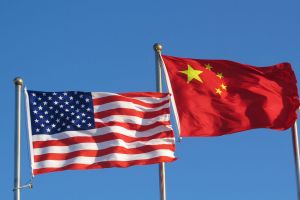This survey indicates that Americans broadly support engaging in trade with China, but are split along partisan lines on how to engage in that trade.
Introduction
While Americans broadly support engaging in trade with China, they are split along partisan lines on how to engage in that trade. Republicans support raising tariffs on Chinese imports and believe it will help the US economy in the long run, while Democrats oppose doing so and believe it will be harmful.
Key Findings
Over the past 18 months, the United States and China have engaged in a steady escalation of tariffs. Beginning with steel and aluminum tariffs imposed by the Trump administration in March 2018, the trade conflict has expanded to cover hundreds of billions of dollars in bilateral trade. Recent rounds of negotiations have made no new progress and have led to both sides escalating further. The most recent US tariffs on Chinese imports went into effect on September 1, covering $112 billion of goods. Beijing has countered with retaliatory tariffs and has halted all agricultural purchases from the United States, a move targeted at already-struggling US farmers.
While Americans broadly support engaging in trade with China, they are split along partisan lines on how to engage in that trade. Republicans support raising tariffs on Chinese imports and believe it will help the US economy in the long run, while Democrats oppose doing so and believe it will be harmful.
- Americans are divided over imposing additional tariffs on Chinese goods, with a narrow majority opposing them (51%; 47% support).
- Tariffs divide Americans sharply along party lines: 72 percent of Republicans support, and 71 percent of Democrats oppose, raising tariffs on products imported from China.
- Majorities across party lines support engaging in trade with China, though Republicans are divided over whether US-China trade does more to strengthen (48%) or weaken (49%) US national security.
- A plurality of Americans (38%) say the US is stronger economically than China, a shift from 2014 when nearly half (45%) saw China as the stronger economy.
Methodology
The analysis in this report is based on data from the 2019 Chicago Council Survey of the American public on foreign policy, a project of the Lester Crown Center on US Foreign Policy. The 2019 Chicago Council Survey was conducted June 7-20, 2019 by IPSOS using their large-scale nationwide online research panel, KnowledgePanel, among a weighted national sample of 2,059 adults, 18 years of age or older, living in all 50 US states and the District of Columbia. The margin of sampling error for the full sample is ±2.3, including a design effect of 1.1607. The margin of error is higher for partisan subgroups or for partial-sample items.
Partisan identification is based on respondents' answer to a standard partisan self-identification question: "Generally speaking, do you think of yourself as a Republican, a Democrat, an Independent, or what?"


